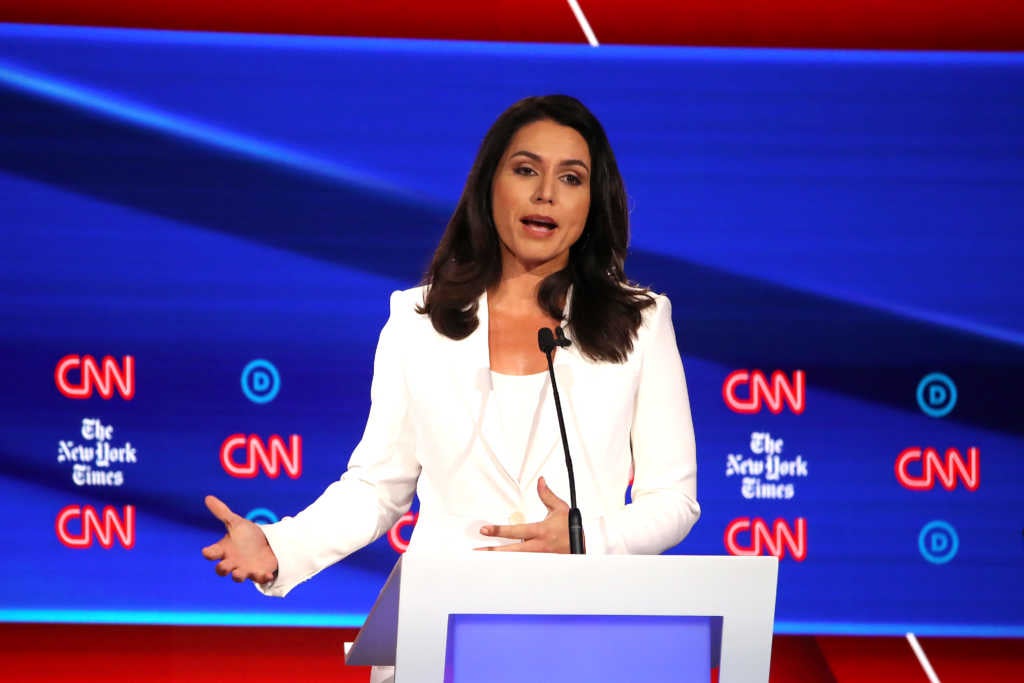Gone are the days of the Clinton-era, when abortion was supposed to be “safe, legal, and rare,” and anyone who beckons for those bygone times is bound to pay for it. Rep. Tulsi Gabbard (D-Hawaii), who once described herself as pro-life but has had an evolution of her own on the issue, stands alone in a crowded field of progressive presidential hopefuls pulling the Democratic Party further to the left.
On Tuesday night, during the latest Democratic presidential debate, Gabbard was a one-woman island when it came to what we now call “reproductive rights.”
When she first entered politics at 21 years old, Gabbard was a social conservative and pro-life. Over the years, though, her perspective on the issue has changed. Last month, she told YouTuber Dave Rubin that, while she would not have an abortion herself, the government “really shouldn’t be in that place of dictating to a woman the choice that she should make.”
Then during the debate, Gabbard said: “I agree with Hillary Clinton one one thing. … When she said abortion should be ‘safe, legal, and rare,’ I think she’s correct.”
To add insult to injury, the presidential hopeful also opposes abortion in the third trimester in an era when “post-birth abortion” is a thing that is actually being debated.
Gabbard’s perspective was once commonplace for Democrats; it was the standard libertarian-ish answer: “Not for me, but free for thee.” Yet somehow, in 2019, to many progressives, the politician’s desire to keep abortion rare is antiquated and dangerous. In today’s Democratic Party, Gabbard is a radical.
If you don’t believe me, just look at the flak ousted Planned Parenthood president Leana Wen, M.D., has received for siding with Gabbard in a tweet posted Tuesday night.
Wen wrote that she agreed with Gabbard, adding, “We should reduce the need for abortions by investing in prevention.” But there is no room for that perspective in the postmodern Democratic Party. One woman called Wen’s words — and presumably Gabbard’s by extension — “harmful” and “stigmatizing.”
Lauren Rankin’s comments might sound intense to those of us who are pro-life, but they are becoming increasingly unexceptional among those in the progressive, pro-choice community. She argued Wen’s desire to reduce the need for abortion “feeds the anti-choice narrative that abortion is inherently bad.” Are we to believe Rankin must see abortion as inherently good.
And since it’s now inherently good, why keep it rare?
To her increasingly progressive colleagues, Gabbard is a living, breathing political target — though when it comes to abortion, for many she’s the only reasonable voice on the stage.
The treatment of Gabbards views are also making sense of Wen’s ouster from Planned Parenthood. At the time, the medical doctor cited “philosophical differences” with the abortion provider’s board chairs. The board reportedly wanted to focus exclusively and bullishly on abortion while Wen wanted to promote Planned Parenthood’s other services alongside its abortion offerings.
Progressives are moving wildly to the left on this issue, and sooner rather than later, they’re going to have to come to terms with the fact that they’re pushing a whole lot of moderate — and pro-life — Democrats and Independents away, along with their votes.



